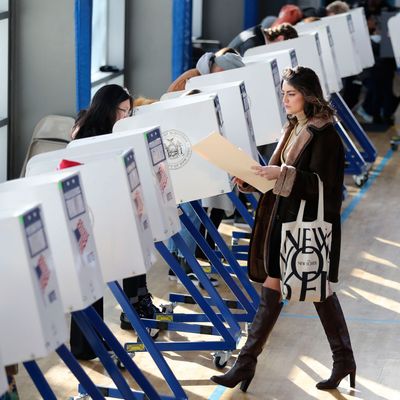
With New Yorkers heading to the polls on Thursday for the gubernatorial primary, it’s a good time to reflect on the dreadful state of the supposedly progressive state’s voting laws. Despite a governor who pays lip service to the issue, New York seems determined to make it difficult for its citizens to cast ballots, forgoing the progress made in much of the rest of the country in recent years. Perhaps not coincidentally, New York has some of the lowest voting rates in America.
Daily Intelligencer spoke briefly with Susan Lerner, the executive director of Common Cause NY, about why New York’s antiquated rules are still with us today, and whether they might change anytime soon.
Can you give me a quick overview of the ways in which New York is worse than other states around the country at making it easy for people to vote?
New York likes to pride itself on being exceptional — and in the area of election administration, it is exceptionally behind. Thirty-seven other states have early voting; we’ve seen waves of reform elsewhere in the past decade, with other states adding features like same-day registration, and pre-registration of 16 and 17-year-olds. Fourteen states have adopted automatic voter registration. Meanwhile, New York is the only state that can’t get its act together to hold a congressional and state primary on the same day. Each primary election costs the taxpayer $25 million, and if we consolidated them, we’d have money left over for early voting.
We’re also one of the few states that doesn’t provide any support to the counties for election costs. Ohio decided electronic poll books were mandatory, so the state gave counties some money to buy them. Another anomaly: are you aware that this Thursday, people outside the southern part of the state can’t cast their ballot until after noon? You can’t make this stuff up.
How did things get this bad?
Election laws were basically written in the 1890s, with minor revisions in the 1930s. Enshrined political parties were the important actors at the time, and the idea was to pit the parties against each other, significantly advantanging their interests over those of voters. This has real consequences when the fastest-growing affiliation for people is “independent.”
It also means inherent resistance to change, because we have a partisan-driven election administration. The commissioners who serve on the Board of Elections split evenly between Democrats and Republicans; our laws require that the staff is duplicated. We’re paying double, not because these people have extensive election experience, but because they are the sister-in-law of an important party official, or were the party treasurer, and they can be reliably trusted. It’s a patronage mill. That isn’t to say that there aren’t good people involved but again, why are they chosen to work for the Board of Elections?
The two parties collude against the voters. And they often deadlock, like when a Republican commissioner in Duchess County decided last summer that changes of address voters made through the DMV were incomplete, and told his staff to stop entering them into the voter rolls. Then, Democrats blocked a DMV transferring procedure the Republicans came up with. It took months of negotiations and pressure from activists to change that.
There’s a spitting match between Democrats and Republicans on the commissions at the local and state level, and the voters are caught in the crossfire.
Is there reason to hope that change is on the horizon?
There’s tremendous pressure on the legislature to move New York’s elections into the 21st century, and it’s not coming exclusively from Democrats and progressives. If you talk to most New Yorkers about this, you’ll hear about the time they had a sick child and it was hard to get to the polls, or — for people who live upstate — Hurricane Irene, or other obstacles. The need for early voting is incredibly obvious.
When we convinced Governor Cuomo to put funding for early voting in his budget, I was told by numerous Republicans: this means the governor is serious, and you’re likely to get it. So when it didn’t pass as part of the budget, when it dropped out instantaneously, it immediately raised questions as to how serious the governor is to making it happen. Over and over, behind the scenes, on both sides of the aisle, people tell us that when the governor is really determined to get something, he gets it.
We hope this election has made it clear to whomever is sworn in this January that election reform must happen. It is a demand of the people of New York.
This interview has been edited and condensed for clarity.






























